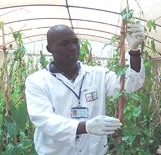GCP capacity building: Finding the champions
- Monday, 05 June 2006 20:24
 Capacity building in the GCP is not just about training in new scientific tools and methods. Scientists and research institutions in developing countries need many other skills and resources besides just technical know-how to effectively employ advanced science in their labs and breeding programs and ultimately develop products to help improve farmer livelihoods. This philosophy lies at the heart of the GCP's capacity building subprogramme, which provides training courses in the research themes of the GCP's genetic diversity analysis, genomics, phenotyping, and bioinformatics that are integrated with seminars on proposal writing, research management, and networking skills.
Capacity building in the GCP is not just about training in new scientific tools and methods. Scientists and research institutions in developing countries need many other skills and resources besides just technical know-how to effectively employ advanced science in their labs and breeding programs and ultimately develop products to help improve farmer livelihoods. This philosophy lies at the heart of the GCP's capacity building subprogramme, which provides training courses in the research themes of the GCP's genetic diversity analysis, genomics, phenotyping, and bioinformatics that are integrated with seminars on proposal writing, research management, and networking skills.
This approach, says Dr. Karl Kunert of the University of Pretoria in South Africa, is essential for building truly sustainable human capacity in the biological sciences in developing countries, particularly in Africa. Active partnership between universities, national research programs, and farmers in Africa is very limited, he comments. With few good examples of functioning technology transfer systems, African scientists, particularly those just starting their careers, only see bits and pieces of the big picture and are thus not as effective as they could be.
One story of the GCP philosophy at work is Jude Obidiegwu, a young scientist from the National Root Crops Research Institute (NRCRI) in Nigeria who participated in the Plant Genetic Diversity and Molecular Marker Assisted Breeding workshop held in Pretoria in June 2005. There, he learned genomic DNA extraction methods, genetic and QTL mapping, development of core collections, and scientific proposal writing.
Obidiegwu works on yam, a crop of high economic and cultural importance in West Africa, but far behind other crops in terms of research investment. Yam improvement faces other major obstacles, too. Each region or village has its own name for different yam cultivars, which makes reliable identification of cultivars and therefore germplasm management and their eventual use for research very difficult, he says. If the GCP has any hope of applying advanced genetics and genomics tools to the improvement of yam, it is researchers like Obidiegwu who will be the foot soldiers of that work in Africa, and who the GCP should be supporting.
According to Obidiegwu, the Pretoria course provided a basis for his PhD studies in the assessment of genetic diversity of West African Dioscorea spp (yam) collection, which he is now completing at the International Institute for Tropical Agriculture (IITA) in Nigeria. The skills he learned in proposal writing also played a key role in his obtaining the PhD fellowship at IITA.
Carmen de Vicente, GCP Subprogramme 5 Leader, subscribes to the lighthouse philosophy of building capacity, which contends that well-trained individual scientists or institutions in a developing country or region can serve as a beacon of best practices and skills to other individuals and institutions in the area to contribute to improved capacity throughout the region. The GCP aims to bring researchers like Jude into the network to serve as champions in research and especially breeding efforts.
Dr. Kunert says this approach of engaging scientists early in their careers is critical to Africa's development. Capacity building has to start at the undergraduate level, but it should extend to supporting post-doctoral scientists as well, for up to five years in Africa with the requirement to visit US and European laboratories to develop research and teaching skills. Kunert practices what he preaches: he teams up with professors from Case Western Reserve University in the US and Rothamsted Research in the UK to link African students and young scientists to mentors in advanced labs in developed countries.
Obidiegwu agrees with this holistic approach: "Training in Africa most often ends with the PhD because of limited funding opportunities. I plan to pursue a post-doctoral position if I can, because I see it as an avenue to develop more research and teaching skills to meet the challenges of the day. It will be another forum for me to interact with great scientific minds."


